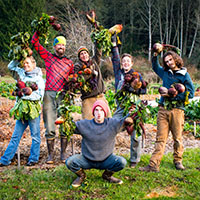Tuesday March 1, 5-6:30 p.m., Orcas Co-op Commons
— from Patrick Bennett —
Intro to Orcas Community Participatory Agriculture
Orcas Community Participatory Agriculture (OCPA) invites you to learn more about our hands-on educational model of growing food and building community. Our hope is to match those islanders interested in being Land Hosts with potential Participants, establishing “neighborhood” clusters in this resilient and scalable model of food production.
Please join us at the Orcas Co-op Commons from 5-6:30 p.m., Tuesday March 1st.
[metaslider id=41973]
OCPA Vision Statement
Orcas Community Participatory Agriculture (OCPA) is a locally-based model of agriculture, education and food distribution. The purpose of the CPA model is to empower people to be creators of the food that nourishes them; we call this food sovereignty. Most importantly, the CPA model focuses on building community. Members are actively working, learning, reskilling and reaping rewards as a group.
What is OCPA?
At its most fundamental level, the CPA model is an education program. Each CPA farm engages an appropriate number of members relative to the site’s potential and limitations. Through hands-on experience, members learn what it takes to grow and process their own food from seed to table, becoming active participants in a year-round local food network. Planning, growing and sharing crops as a cohesive unit results in an improved economy of scale and balanced, stable yields.
How does a CPA work?
There are 3 roles in the CPA model: the Anchor Farmers, the Landhost, and the Participants.
The Anchor Farmers act as educators, organizers and leaders at the farm. They are responsible for guiding and organizing the Participants, facilitating educational opportunities, planning daily operations and events at the farm, and maintaining the collaborative agreements between the Landhost and Participants.
The Landhost provides a venue for the CPA project to take root. Generally, the Landhost contributes monetarily to material infrastructure that will remain on the farm if the CPA project were to change location, or cease to operate. The Host can also act as a Participant.
The Participants are the heart of the CPA model. Each person or family invests money and time on the farm towards growing their own food. Additionally, each Participant learns how to garden both on a large scale, at the farm, and on a smaller scale, at their home.
The CPA model incorporates the Permaculture principle of zoned farming, in this instance on a community scale. The “Zone 2” and “3” crops, which need ample space but less day-to-day, meticulous attention, are the primary focus at the CPA farm site. Whenever possible, the Anchors will help Participants set up their own appropriately sized “Zone 1”/“kitchen” gardens at home, focusing on those crops in need of more consistent attention. Further down the line, members may engage in efforts to provide food storage facilities (pantry, root cellar, etc.) at each home site.
How does the CPA Farm support itself?
Growing high quality, nutritious food locally while educating the community cannot be done for free. The CPA model has some inherent advantages for working towards economic sustainability over the long term.
First, the generosity of the Landhost provides each CPA farm with a long-term, free lease to grow food on their property. The Host is rewarded on many levels, including improved soil tilth and fertility, built up infrastructure, community involvement, and possible property tax breaks under the Current Use Program.
Second, Participants contribute money on a monthly basis to cover the seasonal expenses involved in food production(seeds, soil amendments, tools, etc), as well as providing financial contributions to the stipends received by the Anchor Farmers. Additionally, the CPA team may decide to grow niche market crops to be sold at the local Food Co-op or farm stand.
Finally, given the fundamental goal of education and empowerment, the CPA will seek grants and community benefactors to help support the livelihood of the Anchor Farmers.
For further information please feel free to contact Land Host, Kaj Enderlein kajdawg@rockisland.com; Farm Anchor, Caitlin Herlihy artofnourishment@gmail.com; Farm Anchor, Patrick Bennett goodearthworksllc@gmail.com,
**If you are reading theOrcasonian for free, thank your fellow islanders. If you would like to support theOrcasonian CLICK HERE to set your modestly-priced, voluntary subscription. Otherwise, no worries; we’re happy to share with you.**







